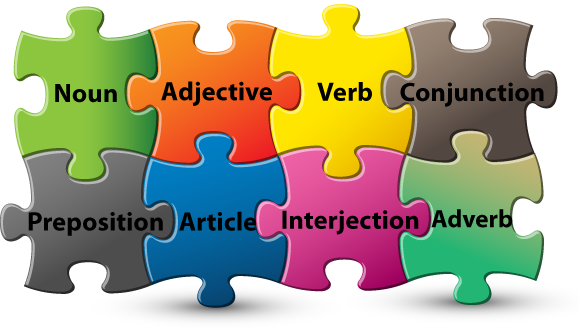Parts of Speech
| Site: | Plateforme pédagogique de l'Université Sétif2 |
| Cours: | WRITTEN EXPRESSION |
| Livre: | Parts of Speech |
| Imprimé par: | Visiteur anonyme |
| Date: | lundi 5 janvier 2026, 03:51 |
Description

1. Classification of Nouns and Pronouns
Nouns
Proper Nouns: refer to specific entities. Writers of English capitalize proper nouns ( Steve, Harvard, or White House
Common nouns :refer to general, unspecific categories of entities (person,university,building)
Countable Nouns : can occur in both single and plural forms, can be modified by numerals, and can co-occur with quantificational determiners (pen,bike,table)
Uncountable Nouns : some nouns are not countable and are called uncountable nouns or mass nouns (water,milk, air) )
Concrete nouns: are nouns that can be touched, smelled, seen, felt, or tasted. ( dog, wool, sugar) )
Abstract Nouns: theoretical concepts use abstract nouns to refer to them (freedom, love, power) )
Pronouns
There are many different kinds of pronouns.
Personal Pronouns (I, you, he, she, it, we, they)
Demonstrative Pronouns(This, that, these those)
Indefinite Pronouns (All, some, any, several, anyone, nobody, each, both, few, either, none,,,,,etc.)
Interrogative Pronouns( Who, which, what, where,how)
Reciprocal Pronouns (each other , one another)
Reflexive Pronouns(myself, yourself,herself, himself)
Possessive Pronouns (My, your, his, her, its, our,their)
Absolute Possessive Pronouns(Mine, yours, his, hers, ours , theirs)
Relative Pronouns(Which, that, who ,whom, whose,where)
2. Verbs
Types of verbs
Action verb
Action verbs are words that express action (give,eat,walk, etc.) or possession (have, own, etc.). Action verbs can be either transitive or intransitive
Transitive verb
Transitive verb always has a noun that receives the action of the verb,called the direct object
Intransitive Verbs intransitive verb never has a direct or indirect object. Although an intransitive verb may be followed by an adverb or adverbial phrase, there is no object to receive its action
Finite and Nonfinite Verbs
Verbs which have the past or the present form are called FINITE verbs. Verbs in any other form (infinitive, -ing, or -ed) are called NONFINITE verbs. This means that verbs with tense are finite, and verbs without tense are nonfinite
Linking vs Action verbs
Linking verbs connects the subject of a sentence to a noun or adjective
that renames or describes the subject
The most common linking verb is the verb to be in all of its forms (am,are, is, was , were).To become ,and to seem are always linking verbs
3. Coordinating Conjunctions
The English language has seven coordinating conjunctions, and they’re easy to remember if you can just remember FANBOYS
For - Explains reason or purpose (just like “because”) I go to the park every Sunday, for I love to watch the ducks on the lake.
And - Adds one thing to another
I go to the park every Sunday to watch the ducks on the lake and the shirtless men playing soccer.
Nor - Used to present an alternative negative idea to an already stated negative idea
I don’t go for the fresh air nor really for the ducks. Honestly, I just like the soccer
But - Shows contrast
The soccer in the park is entertaining in the winter, but it’s better in the heat of summer.
Or - Presents an alternative or a choice
The men play on teams: shirts or skins.
Yet - Introduces a contrasting idea that follows the preceding idea logically (similar to “but”)
I always take a book to read, yet I never seem to turn a single page.
So - Indicates effect, result or consequence
I’ve started dating one of the soccer players, so now I have an excuse to watch the game each week.
4. Adjectives
Adjectives
Adjectives tell us something about a person or a thing.
Adjectives can modify nouns or pronouns/names.
Examples
|
Person |
Thing |
|
Mandy is a careful girl. |
This is a nice car. |
|
Mandy is careful. |
The car is nice. |
|
She is careful. |
It is nice. |
Where do adjectives go?
An adjective can be put before the noun. Then it is an attribute.
Mandy is a careful girl
An adjective can be put after the verb to be (is). This is called predicative position.
This car is nice car
5. Adverbs
Adverbs
Adverbs tell us in what way someone does something. Adverbs can modify verbs ,adjectives, or other adverbs
Examples
to modify verbs
The handball team played badly last Saturday.
to modify adjectives
It was an extremely bad match.
to modify adverbs
The handball team played extremely badly last Wednesday.
Kinds of Adverbs
Adverbs of Manner
She moved slowly and spoke quietly.
Adverbs of Place
She has lived on the island all her life.
She still lives there now.
Adverbs of Frequency
She takes the boat to the mainland every day.
She often goes by herself.
Adverbs of Time
She tries to get back before dark.
It's starting to get dark now.
She finished her tea first.
She left early.
More than one adverb at the end of a sentence
If there are more adverbs at the end of a sentence, the word order is normally:
Manner – Place –frequency- Time.
Peter sang the song happily in the bathroom evenyesterday ing